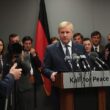A discreet gathering of European political heavyweights is slated for Berlin on Tuesday, raising questions about the evolving dynamics of transatlantic relations and the future of digital governance within the continent. German Chancellor Friedrich Merz (CDU) will host French President Emmanuel Macron and British opposition leader Keir Starmer for a private dinner, an event described by a government spokesperson as “not public.
The meeting, occurring within the familiar “E3” format – traditionally encompassing Germany, France and the United Kingdom – arrives shortly after a summit focused on “digital sovereignty” convened by the German and French Digital Ministries. This summit aims, according to pre-meeting announcements, to provide “a strong impetus for a digitally sovereign Europe.
The carefully orchestrated sequence of events suggests a deliberate effort by Berlin and Paris to define a unified approach to digital policy, potentially diverging from, or at least qualifying, the current trajectory under US influence. The inclusion of Keir Starmer, leader of the Labour Party, speaks to a desire to secure support for a more assertive European digital strategy across the political spectrum in the UK, even amidst ongoing debates regarding its relationship with the EU.
Analysts speculate that the discussions will grapple with contentious issues such as data localization, cloud infrastructure dominance and the burgeoning regulatory landscape surrounding artificial intelligence. Concerns regarding the reliance on US-based tech giants and the potential for regulatory fragmentation within the EU are expected to feature prominently.
The private nature of the dinner further amplifies the political undertones, fueling speculation about the agendas and potential compromises being negotiated. While a unified front on digital sovereignty could bolster Europe’s global influence, critics warn that such a push risks creating barriers to trade and innovation, potentially isolating the continent from crucial technological advancements and hindering economic growth. The summit’s success hinges on striking a balance between asserting European interests and maintaining crucial global partnerships.





